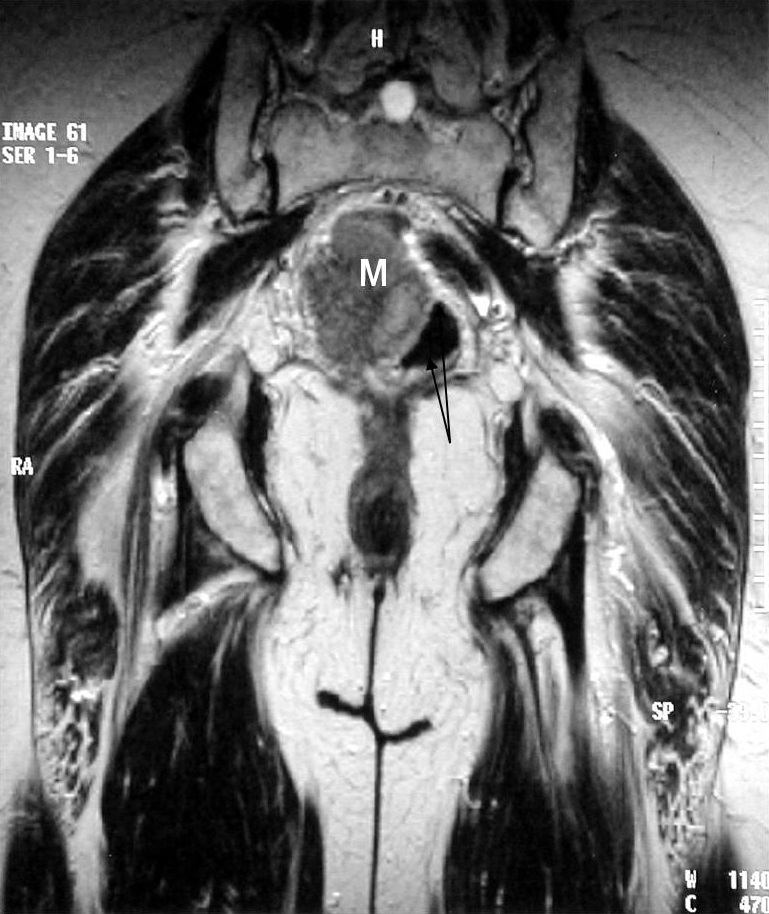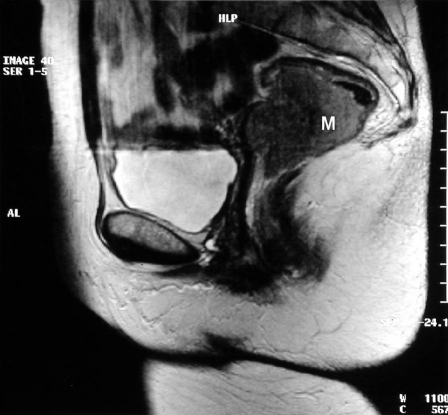Abstract
Mucosa-associated lymphoid tissue (MALT) is a type of extra nodal malignant lymphoma seen in organs such as the stomach, thyroid and salivary glands. Furthermore, occurrence of colorectal MALT lymphoma is extremely rare. We report a case of a solitary rectal MALT lymphoma treated by surgical resection and radiotherapy. Lymphoma should be considered as a rare differential diagnosis when dealing with large bowel pathology. We would advocate the use of surgery as a primary treatment option for a medically fit patient.
Background
The occurrence of colorectal mucosa-associated lymphoid tissue (MALT) lymphoma is extremely rare and the general consensus in regards to its management is not uniform. Treatment options have varied from a simple conservative approach to operative resection. Further, rapid advancement in the field of molecular genetics offers the hope of better understanding of disease aetiology and progression.
Case presentation
A 68-year-old woman was seen in the outpatient department with symptoms of constipation, tenesmus and change in bowel habits for 6 months. There were no other symptoms. The past medical history and family history was insignificant. Clinical examination was normal. Rectal examination revealed soft faeces and a smooth palpable impression in anterior rectal wall extending laterally.
Investigations
Blood investigations, including tumour markers, were within normal limits. Colonoscopy confirmed the mass with normal overlying mucosa. Biopsies showed atypical lymphoid cells and lymphoepithelial proliferation. Radiological imaging showed a 6 cm eccentric primary mass involving the upper rectum and extending into the mesorectal margin on the right side (figures 1 and 2). There was no evidence to suggest local or distant spread.
Figure 1.

Coronal T2 MRI scan sequence of the low MALT rectal tumour (M) showing its anterolateral extension and narrowing of the rectal lumen (arrows).
Figure 2.
Sagittal T2 MRI sequence showing the rectal tumour mass (M).
Treatment
After multidisciplinary meeting discussion, the patient underwent a low anterior resection with primary anastomosis. Postoperative recovery was uneventful. Histology of resected specimen showed features consistent with MALT lymphoma (presence of lymphoepithelial lesions consisting of diffuse proliferation of atypical lymphocytes and glandular destruction). Immunohistochemistry showed positive staining for CD20 (B lymphocyte marker). None of the resected lymph nodes showed presence of tumour.
Outcome and follow-up
Postoperatively, a full lymphoma screening in this patient proved to be negative. Although there was no evidence to suggest a distant spread, there was a concern that the lymphoma was close to the resection margins. Therefore, the patient received adjuvant radiotherapy. It has now been 4 years since the surgery and the patient continues to remain well under surveillance with no signs of recurrence.
Discussion
Primary large bowel lymphomas account for approximately 0.2% of all large bowel malignancies.1 The term MALT lymphoma was coined by Isaacson and Wright2 and is considered as extra-nodal equivalent of B cell lymphoma. The extra-nodal involvement has been found to include organs such as the stomach, thyroid and salivary glands.3 4 Involvement of the colon and rectum is extremely uncommon. Less than 25 cases have been reported in the literature so far.
MALT tumours appear to have similar clinical, pathological and molecular features regardless of organ of origin. There is some evidence to link Helicobacter pylori infection to gastric MALT lymphoma and H pylori eradication treatment has been suggested for low-grade gastric MALT lymphoma.5 6 However the consensus is not uniform. It has also been suggested that colorectal MALT lymphoma may have a similar pathophysiology.7 This has led some to hypothesise that by treating H pylori, one may inadvertently treat MALT lymphoma in the rectum. A case of complete regression of a rectal MALT lymphoma has been reported in a patient after a course of levofloxacin although H pylori infection persisted after cessation of treatment.8 A spontaneous regression of MALT lymphoma in an unfit patient has also been reported.9
As the occurrence of colorectal MALT lymphoma is rare, research-based evidence is still lacking in regards to best management options. A variety of treatment options, including surgery,10 radiotherapy,11 chemotherapy12 or a combination have been recommended. Surgery offers the additional benefit of histological diagnosis and other important prognostic information.
Prognostic factors include tumour stage, nodal status and possibly genetic contribution. For example, a mutation in the P53 gene has been reported to contribute towards development of MALT lymphoma.15 Ashton-Key et al suggested stable expression of bcl-2 gene to be a contributory factor for the good prognosis seen in MALT lymphoma.14
In our report, we advocate the use of surgery in a medically fit patient—a choice recommended by others.10 A multidisciplinary input is recommended. Our patient did not receive any eradication treatment preoperatively owing to lack of firm evidence. A long-term follow-up of different treatment modalities is needed in order to establish the most suitable approach. Further understanding of the role of H pylori in the pathophysiology of rectal MALT lymphoma is needed.
Learning points.
Our report highlights an interesting and rare case of a solitary rectal MALT lymphoma treated successfully by surgical resection and radiotherapy.
The report highlights an unusual presentation of gastrointestinal lymphoma and one should be aware of this possibility when dealing with large bowel pathology.
As yet there are no gold standards, treatment options must be discussed with the patient.
The role of H pylori is of interest and, if proven, may lead to future medical treatments becoming available.
Acknowledgments
The author wishes to express his sincere thanks to Dr M Nayeemuddin, SpR in Radiology, Princess Royal Hospital, Telford, for interpreting the MRI sequence images.
Footnotes
Competing interests None.
Patient consent Obtained.
References
- 1.Shepherd NA, Hall PA, Coates PJ, et al. Primary malignant lymphoma of the colon and rectum. A histopathological and immunohistochemical analysis of 45 cases with clinicopathological correlations. Histopathology 1992;102:235–52 [DOI] [PubMed] [Google Scholar]
- 2.Isaacson P, Wright DH. Malignant lymphoma of mucosa-associated lymphoid tissue. A distinctive type of B-cell lymphoma. Cancer 1983;52:1410–16 [DOI] [PubMed] [Google Scholar]
- 3.Thieblemont C, Bastion Y, Berger F, et al. Mucosa-associated lymphoid tissue gastrointestinal and nongastrointestinal lymphoma behavior: analysis of 108 patients. J Clin Oncol 1997;15:1624–30 [DOI] [PubMed] [Google Scholar]
- 4.Thieblemont C, Berger F, Dumontet C, et al. Mucosa-associated lymphoid tissue lymphoma is a disseminated disease in one third of 158 patients analyzed. Blood 2000;95:802–6 [PubMed] [Google Scholar]
- 5.Wotherspoon AC, Ortiz-Hidalgo C, Falzon MR, et al. Helicobacter pylori-associated gastritis and primary B-cell gastric lymphoma. Lancet 1991;338:1175–6 [DOI] [PubMed] [Google Scholar]
- 6.Wotherspoon AC, Doglioni C, Diss TC, et al. Regression of primary low-grade B-cell gastric lymphoma of mucosa-associated lymphoid tissue type after eradication of Helicobacter pylori. Lancet 1993;342:575–7 [DOI] [PubMed] [Google Scholar]
- 7.Matsumoto T, Iida M, Shimizu M. Regression of mucosa-associated lymphoid-tissue lymphoma of rectum after eradication of Helicobacter pylori. Lancet 1997;350:115–16 [DOI] [PubMed] [Google Scholar]
- 8.Dohden K, Kaizaki Y, Hosokawa O, et al. Regression of rectal mucosa-associated lymphoid tissue lymphoma but persistence of Helicobacter pylori infection of gastric mucosa after administration of levofloxacin: case report. Pathol Res Pract 2001;197:385–93 [DOI] [PubMed] [Google Scholar]
- 9.Takenaka R, Tomoda J, Sakata T, et al. Mucosa-associated lymphoid tissue lymphoma of the rectum that regressed spontaneously. J Gastroenterol Hepatol 2000;15:331–5 [DOI] [PubMed] [Google Scholar]
- 10.Orita M, Yamashita K, Okino M, et al. A case of MALT (mucosa-associated lymphoid tissue) lymphoma occurring in the rectum. Hepatogastroenterology 1999;46:2352–4 [PubMed] [Google Scholar]
- 11.Kobayashi T, Takahashi N, Hagiwara Y, et al. Successful radiotherapy in a patient with primary rectal mucosa-associated lymphoid tissue lymphoma without the API2-MALT1 fusion gene: a case report and review of the literature. Leuk Res 2008;32:173–5 [DOI] [PubMed] [Google Scholar]
- 12.Gezen C, Kement M, Oncel M, et al. Mucosa associated lymphoid tissue lymphoma of the colon: a case report. Cases J 2009;2:9316. [DOI] [PMC free article] [PubMed] [Google Scholar]
- 13.Krugmann J, Dirnhofer S, Gschwendtner A, et al. Primary gastrointestinal B-cell lymphoma. A clincopathological and immunohistochemical study of 61 cases with an evaluation of prognostic parameters. Pathol Res Pract 2001;197:385–93 [DOI] [PubMed] [Google Scholar]
- 14.Ashton-Key M, Biddolph SC, Stein H, et al. Heterogeneity of bcl-2 expression in MALT lymphoma. Histopathology 2007;1:75–8 [DOI] [PubMed] [Google Scholar]
- 15.Gaidano G, Volpe G, Pastore C, et al. Detection of BCL-6 rearrangements and p53 mutations in Malt-lymphomas. Am J Hematol 1997;56:206–13 [DOI] [PubMed] [Google Scholar]



